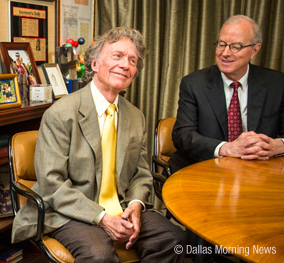© 2015 The Texas Lawbook.
By Mark Curriden
(April 16) – The Internal Revenue Service issued what is believed to be a record-setting $3.2 billion tax bill Wednesday against Dallas entrepreneur and philanthropist Sam Wyly and the estate of his brother, Charles Wyly.
The IRS, in court documents filed late Wednesday in U.S. Bankruptcy Court in Dallas, claims that Sam Wyly owes $2,029,481,997 in back taxes, penalties and interest from income generated from trusts that the brothers established in the Isle of Man more than two decades ago.

More than 75 percent of the $3 billion are penalties for not filing the appropriate forms with the IRS and interest that has collected on the penalties and unpaid taxes.
Tax lawyers said Thursday that the tax claims against the Wylys – both individually and combined – are believed to be the largest penalties ever sought by the IRS against individuals. Last year, the IRS hit global banking giant Credit Suisse with a $2.6 billion levy. In 2006, the tax agency levied a $3.4 billion penalty against pharmaceutical giant Glaxo SmithKline.
“The IRS figures are baloney,” Sam Wyly told The Texas Lawbook late Wednesday. “I paid $160 million in taxes in the last 22 years, and my brother, Charles, paid $80 million. We firmly believe we have paid all the taxes we owe.
“We believe the IRS figures are so absurd as to undermine the credibility of the IRS,” he said.
The trusts were created in the early 1990s for the purpose of converting equity wealth they earned from their various business interests into a fixed annual income stream, Wyly said.
The U.S. Securities and Exchange Commission sued the Wylys, alleging the brothers violated federal insider trading laws. A federal judge in New York rejected the insider trading allegations, but a jury last May ruled the Wylys hid stock trades through the offshore trusts. The judge ordered the brothers to pay a combined $299 million in penalties.
Lawyers for the Wylys hired former Stanford Law School Dean Kathleen Sullivan to appeal the New York decision in the securities fraud case.
The Wylys created the series of trusts in the early 1990s. The trusts are worth about $382 million and pay Wyly about $16 million a year, according to court documents.
Sam Wyly filed for Chapter 11 bankruptcy protection last fall in hopes that the claims by the SEC and IRS can be resolved through a global settlement agreement, according to Josiah Daniel, a Vinson & Elkins partner who represents Wyly.
“This submission by the IRS is shocking,” Daniel said. “No one expected anything close to this amount. It may be unprecedented.”
Dee Wyly, Charles’ widow, also filed for bankruptcy in Dallas last October. The federal court approved a monthly budget of about $33,000 for Dee Wyly. Half of the $33,000 goes toward maintenance of her Colorado home, which is currently for sale.
“Dee Wyly, has no idea how they arrived at these figures, nor does she have the means to pay such a gargantuan sum,” Stewart H. Thomas, a lawyer has represented the Wyly family and its business interests for many years, said Thursday in a written statement.
“She and her late husband hired countless attorneys and accountants to advise them and help them fully comply with the IRS’ very complicated tax code,” said Thomas, who is a partner at Hallett & Perrin in Dallas. “They have paid huge amounts of taxes every year, always intending to pay every penny they owe.
Wyly says he turned over more than 1.4 million pages in financial documents to the government already, dating back to 1992 when the trusts were established.
“We filed thousands and thousands of financial documents with the IRS and SEC, but the case against us was basically, we should have filed a few more,” he told The Texas Lawbook in an interview last month. “But no one lost any money.”
Daniel said U.S. Bankruptcy Judge Barbara Houser has set aside four weeks in January for the parties to present evidence regarding the IRS’ claim. The judge will then decide the “allowable amount.”
“Filings were made with the SEC and IRS by knowledgeable and honest CPAs and lawyers who had to deal with legalese sometimes defined in different ways in different parts of the regulations written by the same agency or the other agencies,” Wyly said Wednesday evening.
“So, we respectfully disagree with the claim filed by the IRS and look forward to our hearing in the Bankruptcy Court,” he said.
Wyly founded University Computing Co. in 1963 with only $1,000 in the bank and grew it into a multi-million-dollar computer services company. In 1967, Sam and Charles purchased the Bonanza Steakhouse chain and expanded it to 600 stores before selling it in 1989. In 1982, the Wylys bought the controlling interest in Michael’s, the craft store chain. It grew from a $10 million in revenue private company in 1982 to $1.2 billion public company in 2006.
© 2015 The Texas Lawbook. Content of The Texas Lawbook is controlled and protected by specific licensing agreements with our subscribers and under federal copyright laws. Any distribution of this content without the consent of The Texas Lawbook is prohibited.
If you see any inaccuracy in any article in The Texas Lawbook, please contact us. Our goal is content that is 100% true and accurate. Thank you.
